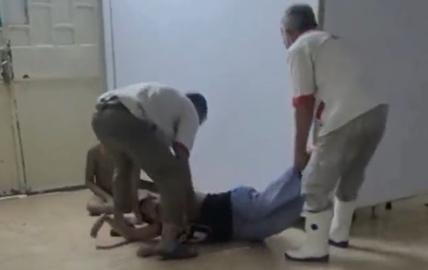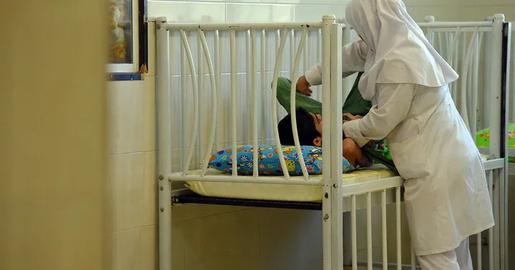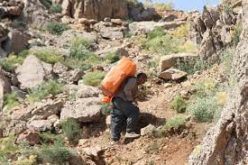Iranwire – On July 24, the Iranian Campaign to Support the Rights of People with Disabilities shared a disturbing video that showed violent treatment and neglect of people with serious disabilities at a care center in Ahvaz, Khuzestan province. It included footage of a young woman being restrained on the floor half-inside a bathroom stall, a man having a seizure apparently going ignored, and a number of clearly emaciated individuals crammed into one small room together on cots, cooled only by a single fan.

In the tweet, the campaign said reports it had received “tell stories of violence and abuse of the disabled at this center. They are kept in unacceptable sanitary and medical conditions and suffer from malnutrition.”

در مرکز توانبخشی احسان اهواز چه خبر است؟!
گزارشات رسیده از خشونت و بدرفتاری با معلولان در این مرکز حکایت دارد.معلولان در وضعیت بغرنج بهداشتی،تغذیهای و درمانی نگهداری میشوند. اگر کسی تشنج کند کسی به فریادش نمیرسد.در گرمترین نقطه کره زمین با پنکه معلولان را خنک میکنند! pic.twitter.com/EVV2msoU9T— کمپین معلولان (@dscampaign1) July 24, 2022
The Welfare Organization, it added, had known about the situation at the Ehsan Ahvaz Rehabilitation Center for years. Last winter, two people with Down’s syndrome – who were not bedridden – died in the same facility with infections from bedsores. Complaints filed by their families to the Welfare Organization, whose budget increased by 47 percent this year, went unanswered.
“We’ve Seen This Before”
Negin Hosseini, a journalist and long-time defender of the rights of people with disabilities, told IranWire the emerging scandal at the Ehsan Rehabilitation Center is symptomatic of a much wider problem in Iran.
“The reasons for events like this at care hubs for the disabled,” she said, “are low standards, the hiring of staff without specialized knowledge or skills, low staffing, long working hours and high pressure.
“Most people have only seen this video. But we and many family members of people with disabilities have seen the bruises, marks and injuries on their bodies: not just those of children but of adults unable to defend themselves.”
Mina Dashtbali, a social worker, said the same: “These centers only offer very limited services. The families of children with autism, and those in need of physical or mental support, come to places like this because they don’t have the resources to care for them themselves.
“In this video, we can see no attempt to respect human dignity. Violence against people with disabilities comes in many different forms, and a failure to provide medication or things like crutches to help them move, tying them to beds or verbal abuse are all among them.”
Both said that women and girls with disabilities can be acutely vulnerable in “care” settings like this. In April Behrooz Morovvati, director of the Campaign for the Disabled, reported that many women with disabilities had been raped by staff members.
Last August the news agency HRANA reported that three women with disabilities had been raped by staff at a care center in Urmia, West Azerbaijan. A day later, the director-general of the Welfare Organization in that province denied the story, calling it “just a claim”.
Commitments Still Unmet
Iran is a signatory of the 2007 UN Convention on the Rights of Persons with Disabilities (CRPD) which demands inclusive education and “reasonable accommodation” that guarantees those with disabilities “enjoyment or exercise on an equal basis with others of all human rights and fundamental freedoms”.
In addition, it demands that states recognize their right to an adequate standard of living, to live in the community, and and to full inclusion and participation in public life. In practice this means moving away from a model in which those with physical or mental disabilities are kept isolated in large facilities like the Ehsan.
Iran has pledged to enact out these provisions but, Hosseini says, has yet to do so. “The Welfare Organization has never admitted it has a duty to make fundamental changes. These centers continue to operate without supervision.”
 Shabtabnews In this dark night, I have lost my way – Arise from a corner, oh you the star of guidance.
Shabtabnews In this dark night, I have lost my way – Arise from a corner, oh you the star of guidance.



